

Soldiers, Spies and Statesmen: Egypt's Road to Revolt. Putting together pieces of Egypt’s militarized past. One might not agree with Hazem Kandil’s “Soldiers, Spies and Statesmen: Egypt’s Road to Revolt” that the competing roles of the military and security apparatus have been some of the main agents and causes for change in Egypt.
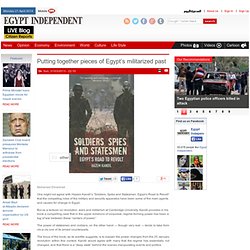
But as a lecturer on revolution, wars and militarism at Cambridge University, Kandil provides in his book a compelling case that in the upper echelons of corporeal, regime-forming power has been a tug of war between these “centers of power.” Nasser_Philosophy. Commemorating the Nation.
Adaptable Autocrats: Regime Power in Egypt and Syria - Joshua Stacher. Book excerpt: Josh Stacher's "Adaptable Autocrats" One-time contributor to the blog Joshua Stacher recently published his book, Adaptable Autocrats: Regime Power in Egypt and Syria.

Since the 2011 uprisings, there has been a debate in Middle Eastern academia as to whether regional specialists focused too much on the persistence of authoritarianism (and power elites in particular) and not enough on the societies (and social movements in particular.) Of course, the two are not mutually exclusive, and the debate has had its ups and down according to what’s in the news.
In this book, Josh looks the regime structures as an indication of both regime sustainability and adaptability, and applies this research to how Egypt and Syria handled the uprisings and their aftermath. Josh writes: Rather than explain the transition, this book compares how the structure of executive power allows for an authoritarian regime to change its ruling coalition (or not).
The Autumn of Dictatorship: Fiscal Crisis and Political Change in Egypt under Mubarak - Samer Soliman. "Samer Soliman's The Autumn of Dictatorship: Fiscal Crisis and Political Change in Egypt Under Mubark was well-received in opposition circles when first published in Arabic in 2004.
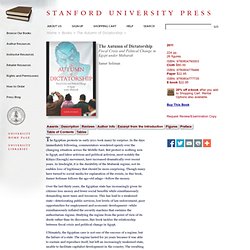
Critics of the regime welcomed the careful documentation of just how draining the immense security apparatus has been. . . How good it is to have these arguments placed on solid empirical ground. Evidence-based arguments in Middle East studies are a threatened species so this book should have a place on all our shelves.
"—Raymond William Baker, Middle East Journal "Drawing on Western social science and financial data gleaned from the balance sheet of the Egyptian general budget, Soliman provides a rigorous analysis of the chronic fiscal crisis that has plagued Egypt since the mid-1980s . . . A Grand Delusion: Democracy and Economic Reform in Egypt - Eberhard Kienle. Elections and Distributive Politics in Mubarak's Egypt. Lisa Blaydes - Stanford. Book Review: Elections and Distributive Politics in Mubarak’s Egypt. L.
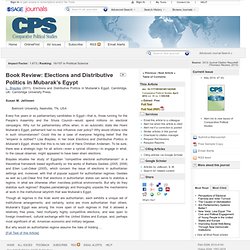
Blaydes (2011). Elections and Distributive Politics in Mubarak’s Egypt. Cambridge, UK: Cambridge University Press. Every five years or so parliamentary candidates in Egypt—that is, those running for the People’s Assembly and the Shura Council—would spend millions on electoral campaigns. Why run for parliamentary office when, in an autocratic state like Hosni Mubarak’s Egypt, parliament had no real influence over policy?
Blaydes situates her study of Egyptian “competitive electoral authoritarianism” in a theoretical framework based significantly on the works of Barbara Geddes (2005, 2008) and Ellen Lust-Oskar (2005), which concern the issue of elections in authoritarian settings and, moreover, with that of popular support for authoritarian regimes. Though all regimes in the Arab world are authoritarian, each exhibits a unique set of institutional arrangements; and certainly, some are more authoritarian than others. Nasser's Blessed Movement: Joel Gordon. Egypt in the Era of Hosni Mubarak, 1981–2011. “[A] tremendous read.”
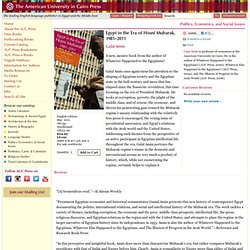
—Al Ahram Weekly. Galal Amin - Authors Profile. Galal-Amin. Political Life in Cairo’s New Quarters. Professor Salwa Ismail. Muslim Extremism in Egypt : Gilles Kepel. Sayyid Qutb and the Origins of Radical Islamism. John Calvert. Associate Professor of History Holder of the Henry W.
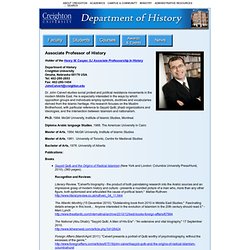
Casper, SJ Associate Professorship in History Department of HistoryCreighton UniversityOmaha, Nebraska 68178 USATel: 402-280-2653Fax: 402-280-1454JohnCalvert@creighton.edu Dr. John Calvert studies social protest and political resistance movements in the modern Middle East. Ph.D. 1994. Master of Arts, 1984. Master of Arts, 1981. Bachelor of Arts, 1978. Professor Gilles Kepel. The Striking Cabbies of Cairo and Other Stories. Dr John Chalcraft. On the State of Egypt: What Caused the Revolution. Columbia University. Timothy Mitchell is a political theorist who studies the political economy of the Middle East, the political role of economics and other forms of expert knowledge, the politics of large-scale technical systems, and the place of colonialism in the making of modernity.
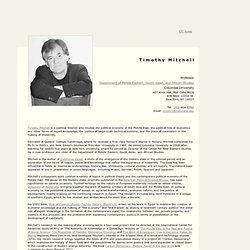
Educated at Queens' College, Cambridge, where he received a first-class honours degree in History, Mitchell completed his Ph.D. in Politics and Near Eastern Studies at Princeton University in 1984. He joined Columbia University in 2008 after teaching for twenty-five years at New York University, where he served as Director of the Center for Near Eastern Studies.
Tim Mitchell - Colonizing Egypt. Book Description Publication Date: 1 July 1992 Extending deconstructive theory to historical and political analysis, Timothy Mitchell examines the peculiarity of Western conceptions of order and truth through a re-reading of Europe's colonial encounter with nineteenth-century Egypt.
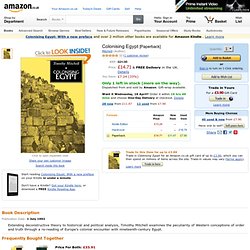
Frequently Bought Together Customers Who Bought This Item Also Bought Product Description Review. Rule of Experts : Timothy Mitchell. Can one explain the power of global capitalism without attributing to capital a logic and coherence it does not have?
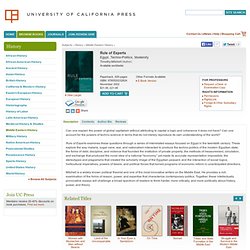
Can one account for the powers of techno-science in terms that do not merely reproduce its own understanding of the world? Rule of Experts examines these questions through a series of interrelated essays focused on Egypt in the twentieth century. Mitchell is a widely known political theorist and one of the most innovative writers on the Middle East. He provides a rich examination of the forms of reason, power, and expertise that characterize contemporary politics.
Together, these intellectually provocative essays will challenge a broad spectrum of readers to think harder, more critically, and more politically about history, power, and theory. List of Illustrations Acknowledgments Note on Transliteration Introduction I. NotesSelect BibliographyIndex “Timothy Mitchell’s new book is brilliant. “Exciting and intellectually stimulating.” Understanding Cairo: The Logic of a City Out of Control. Visitors to Cairo probably come away with the same images stuck in their heads: the yellow air, snarled traffic, crumbling colonial architecture, trash piles, et cetera.

These are all, of course, part of the contemporary urban reality of the largest city in Africa. Sims' new book, however, is the best--perhaps only--compact source that discusses the sides of the city visitors rarely have reason to see: the massive informal residential expansion and the new desert cities. A simple figure immediately alter one's perspective: already in 1996, 62% of the population was living in areas informally developed since 1950 (p. 69). That is, nearly 2/3 of the city lives in areas organically grown and not overseen by any government planning body. 2050 Or Bust. THIS PAST AUGUST IN HELIOPOLIS, the Cairo suburb built over desert by a Belgian industrialist in 1905, I sat in an architect's office, a place called Cube Architectural Consultants, and heard a glowing, impromptu presentation on "Cairo 2050.
"